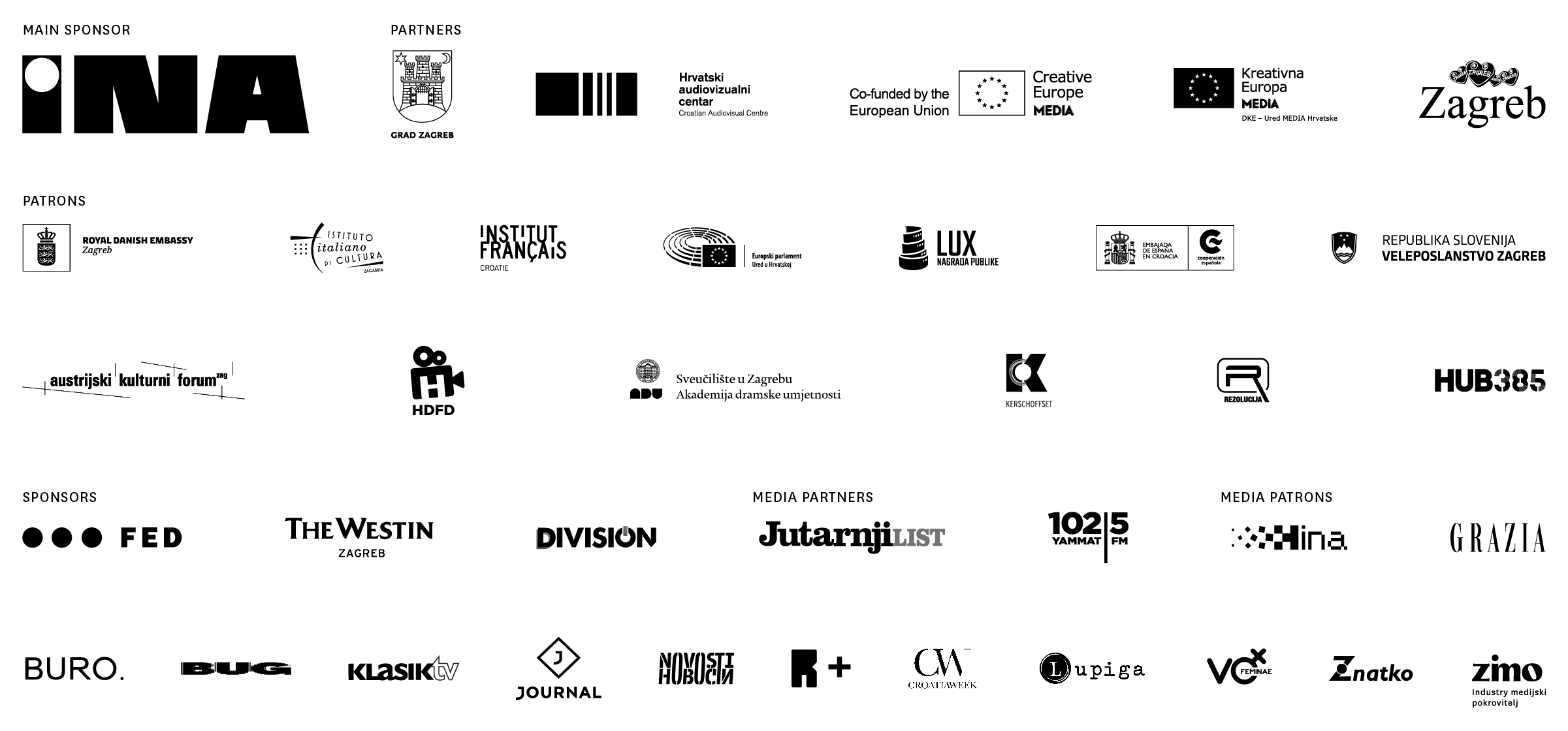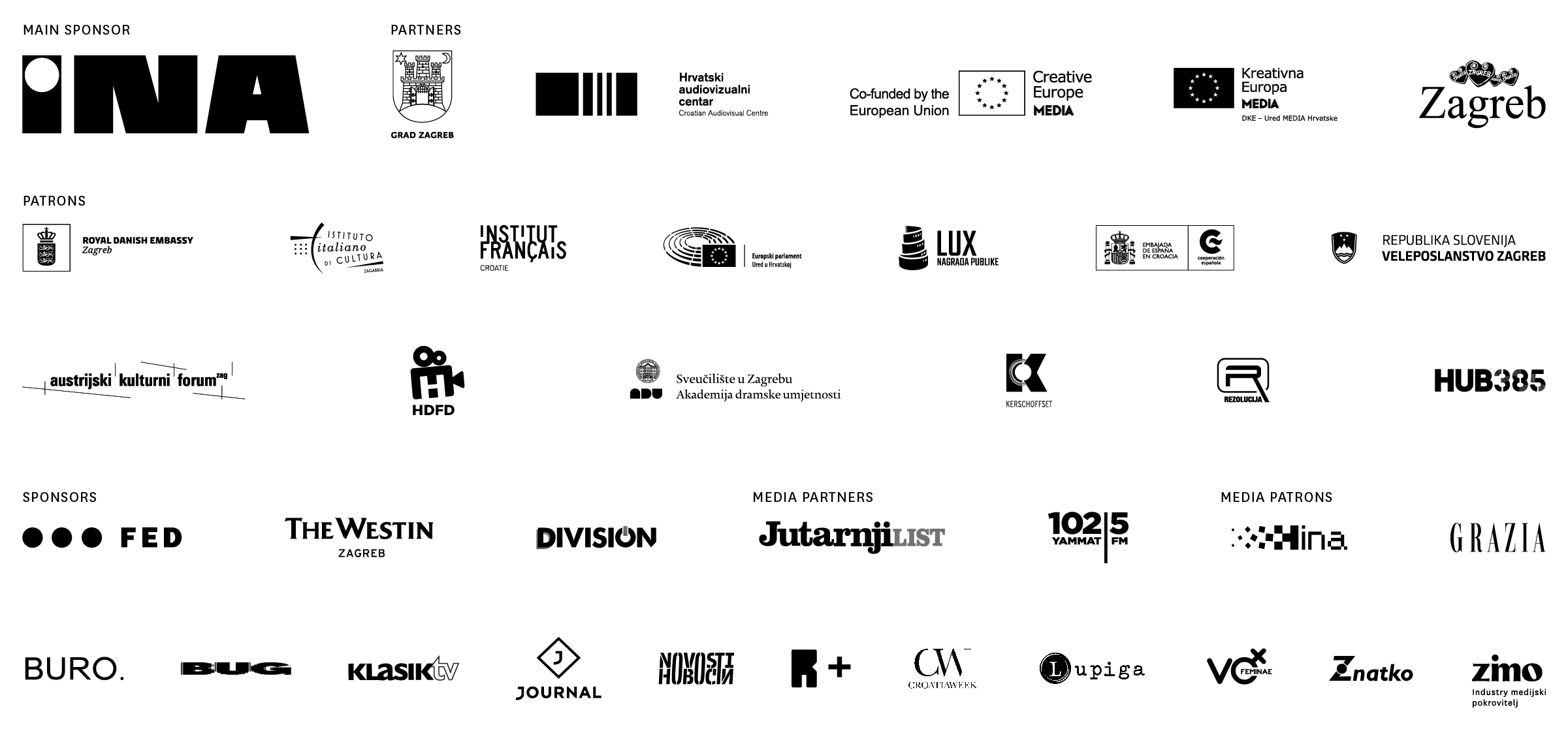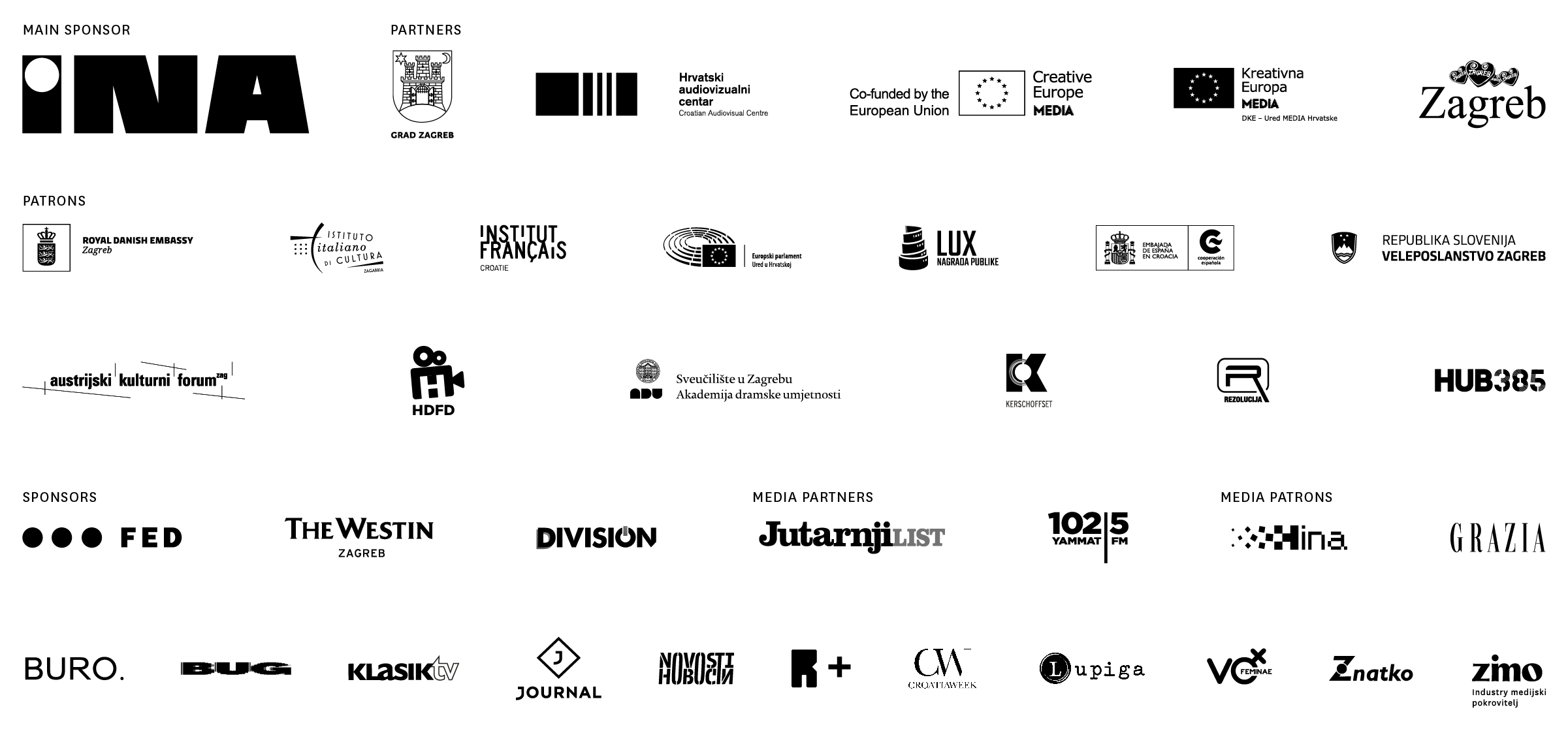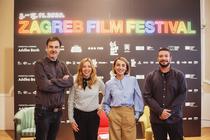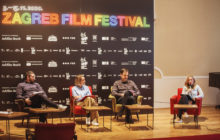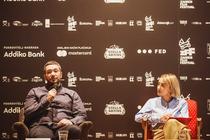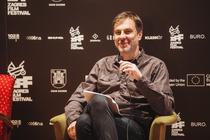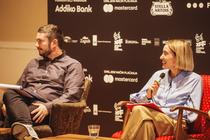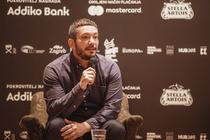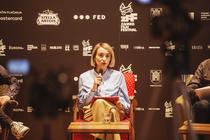18th Zagreb Film Festival Program Unveiled
03. November
The program for Zagreb Film Festival was presented at a press conference. Its eighteenth edition will be held online from 8th to 15th of November on platforms kinoeuropa.hr and croatian.film, and on the official web page, www.zff.hr. Festival director Boris T. Matić, executive producer Hrvoje Laurenta, producer Lana Matić and coordinator for the KinoKino festival Katarina Crnčić presented the festival via live stream from the Croatian Music Institute.
“We are on the cusp of adulthood, and like every teenager entering the adult world, we’re facing new challenges. In light of the current epidemiological situation, we’ve decided to hold the festival online and preserve the audience’s and festival crew’s health. So this year, there won’t be some of the events that refine our festival story, but we’ll still have what matters most – great films from all over the world, the same number of them as last year. We’ve arranged around one hundred films in four competition programs – feature, international short film, domestic short film Checkers, and Together Again, two side programs – The Great 5 and Festivals in the Spotlight – and the KinoKino Festival program, which is being held this year under the banner of ZFF. Online screenings aren’t news to us – we’ve started them on www.kinoeuropa.hr and croatian.film at the start of the year, and the audience’s positive response surprised us. We’re happy that spectators from all over Croatia will be able to enjoy our screenings simultaneously from their homes, and we’re pleased by the reactions of followers on social media who tell us that they’ve prepared “festive blankets” and homemade popcorn recipes,” said Boris T. Matić.
Boris T. Matić commented on the features of the selection of the feature competition program: “Over the last year we searched for new and interesting debut films from around the world and, finally, from a large number we’d seen we’ve chosen the films we’re presenting here today. In the feature competition we have two films whose directors come from countries which are not often on our film radar, and which put political and historical topics in the context of humor and fantasy. The Palestinian film and their current Oscar contender, Gaza mon amour, by director brothers Tarzan and Arab Nasser is a lively depiction of modern life under occupation which reveals how even the greatest love story can be destroyed by a repressive state. Main roles in this satire about love and repressed passion were given to stars of popular shows, Salim Daw (Fauda) and Hiam Abas (Succession). The Orphanage by Afghan director Shahrbanoo Sadat is a bittersweet story about growing up in Afghanistan during the Soviet occupation in late 1980s and told by a combination of Bollywood fantasy, folklore and, at times, painful realism. The film premiered at the Directors’ Fortnight in Cannes.
Three films in the main program are stories about heroines who change, mature, and emancipate in new, unfamiliar, and not always well-meaning surroundings. The question of boundaries between forced and consensual sex in a story about a 15-year-old skier Lyz and her older coach (Jérémie Renier – In Bruges, The Unknown Girl) is posed by the sports drama Slalom, a debut film by French director Charlène Favier from this year’s Cannes’ official selection. The film was shot on the beautiful slopes of the Les Arcs ski resort which R. Östlund used for his Force Majeure. In an interesting character study in the film Sweat, Swedish-Polish director Magnus von Horn deals with the emotional and psychological consequences of constant star exposure on social media. We follow three days in the life of a super-popular fitness influencer, Sylwia (Magdalena Kolesnik), during which we can see the layers of her impeccable facade slowly peeling off. Sweat won the main award at the festival in Chicago and it was officially selected for this year’s Cannes. On her way to personal transformation we also meet the heroine of Pari by Greek director of Iranian descent, Siamak Etemadi. The film premiered at this year’s Berlinale. Pari is a story about a Muslim mother from Iran and her search for her son who went missing in Greece. In a new and unknown world to her, Pari is forced to discard the layers of her old identity, even those which shaped her as an exemplary and obedient wife.
The sins of ruthless and corrupt systems and injustices inflicted on marginalized individuals and groups are the topic of three powerful dramas partially based on real events. Listen, a directorial debut by actress and director Ana Rocha de Sousa, is compared to films by Ken Loach, and won five awards in Venice, including the Lion of the Future for best debut film. The story follows the struggles of an immigrant family against British social services and it is inspired by real-life events of so-called forced adoptions in London. The topic of forcibly removing children from their families is also present in Father by Srđan Golubović which is shown at ZFF outside the competition. Goran Bogdan impressed as the lead, using his inner strength to portray a desperate father, who from a marginalized loser becomes the hero of our age. The film premiered in the Panorama program in Berlin where it won the audience award and the Ecumenical jury prize, and in Pula it won the Golden Gate audience award as the first film in the history of that festival with an average audience score of 5,0.
Another winner from Venice (Venice Days, Europa Cinemas Label award) which will be featured in the main program of ZFF deals with the lives of marginalized people. Oasis by Serbian director Ivan Ikić (Barbarians, 2014) is an unusual story about a love triangle from a Belgrade home for special needs children and youth. Starring are the real wards of the special needs home Sremčica: Marijana Novakov, Valentino Zenuni, and Tijana Marković, while other roles are played by Goran Bogdan and Maruša Majer.
Alongside the aforementioned Father and Oasis, regional filmmakers are represented in the main program with the Bosnian film Full Moon by Nermin Hamzagić. The film won the Ecumenical jury prize in Cottbus, as well as the best actor award (Alban Ukaj), and it is on the list of nominees for the European Film Academy award for best debut film. The main program also features Havel, a biographical film about the famous Czech writer, political dissident and national leader, Václav Havel. With his recognizable, theatrical humour which finds nothing sacred, the second film by Slávek Horák (Home Care – ZFF 2015) is an ode to Havel as an artist, a great entertainer, but also a man of action who with his deep understanding of human nature knew not only to entertain, but also inspire and move masses to change the world.”
Hrvoje Laurenta presented 18th ZFF’s short film competition program: “We have 12 films in the international short film competition, and two of them are Croatian co-productions: All Dogs Die by the award-winning Icelandic director Ninna Pálmadóttir (Castor Multimedia), and Deer by Hungarian director István Hevesi (Eclectica). The selection includes I Am Afraid to Forget Your Face by Sameh Ala, the first Egyptian film in 50 years to be included into the short film selection at Cannes where it won the Palme d’Or for best short film, the Colombian Between You and Milagros by Mariana Saffon, awarded as the best film of the Horizons program in Venice, and the film Leave of Absence by Russian director Anton Sazonov who won the best director award in Locarno. From Critics’ Week in Cannes we have the French film Dustin by Naïla Guiguet, from the short film competition in Cannes the Greek film Motorway 65 by Evi Kalogiropoulou, and from Venice we have the Portuguese film The Shift by Laura Carreira, nominated for the European Film Award. In the race for the Golden Pram in the short film competition, we also have the Bulgarian film, Motherland, by director Kristina Spasovska, the Dutch film En Route by Marit Weerheijm, the Turkish film Mamaville by Irmak Karasu, and the Serbian film Way Back by Aleksandar Adžić.
Checkers are the competition program for Croatian short films and one of the most significant platforms for promoting young film talents in Croatia. In February this year, the program was upgraded in the form of an internet platform, croatian.film, where seven films chosen by our longstanding programmer, Vladimir Gojun, will be screened. The films are: Nine Months, a new film by Josip Lukić (Boo-boo Boo hoo hoo – ZFF 2015; Summer Fruits – special mention, ZFF 2019), Angina Pectors, a new film by Filip Mojzeš (Elephant’s Graveyard – ZFF 2019), I’m Not Telling You Anything, Just Sayin’ directed by actress, scriptwriter and director Sanja Milardović, Forest by Sara Grgurić, Sultriness by Petar Vukičević, Tenant by Borna Zidarić, and Bepo by Filip Antonio Lizatović. The winner of the award will also receive 10 000 Kuna by the Croatian Film Directors’ Guild.”
Together Again competition program, in which we see new films by already established authors, was presented by Boris T. Matić: “The program brings nine films by authors whose work ZFF has been following from their beginnings. Among them is Radu Jude, one of the leading Romanian directors and two-time winner of ZFF (The Happiest Girl in the World – ZFF 2009, Special Mention; Everybody in Our Family – ZFF 2012, Golden Pram; Aferim! – ZFF 2016). In his newest film, Uppercase Print, Jude digs deep into the archives of Ceauşescu’s regime, giving us a fascinating insight into the secrets of the nation’s past with an important warning about the dangers of collective forgetting. For the sixth time at ZFF, we have Canadian director Xavier Dolan who won the Golden Pram in 2009 for best film for his feature debut I Killed My Mother. His new film Matthias & Maxime is a romance built on the awkwardness of manhood and is a wistful study of love and friendship. Icelandic director Rúnar Rúnarsson (Volcano – ZFF 2011; Sparrows – ZFF 2015) returns to the ZFF program with an atypical Christmas film, Echo, in which he uses 56 poetic tableaus to reveal Iceland in all its complex fullness, composing an incisive, but gentle portrait of contemporary society. The program also features a new film by the Golden Pram winner for his feature debut, The Lunchbox (ZFF 2013), Photograph by Ritesh Batra. In his charming fourth film, Batra draws inspiration from Bollywood musicals and Shakespeare’s comedies to offer a different story about love in the contradictory world of urban India. Director Carlos Marques-Marcet (10.000 KM – ZFF 2015; Anchor and Hope – ZFF 2018) returns to ZFF with The Days to Come, an authentic story about pregnancy and transformation of a relationship in which a camera follows the real pregnancy of the lead actors.
Last year brought several important regional successes which we can proudly present in the Together Again program. The year was marked in Croatia by strong women in film, and among them is the absolute winner of Pula, Tereza37 by Danilo Šerbedžija with Lana Barić as the lead actress and scriptwriter. A devastating drama about a woman in her late thirties who decides to change her stale marriage and find her piece of happiness. There is also Mare in which director Andrea Štaka expertly unravels the layers of female identity in a small Croatian town with an exceptional performance by Marija Škaričić, awarded with the Heart of Sarajevo for best actress. Then we have Mater, a story about an anxious and tyrannical relationship between mother and daughter with Darija Lorenci Flatz in the lead role, awarded the Golden Arena in Pula as best actress, while director Jure Pavlović received the award for best debutant. The program also features the new film by Pjer Žalica, a black comedy, Focus, Grandma, in which, as in every decent Balkan family, a fight for inheritance turns into a family war, while the real war is just around the corner, and the breakdown of a family becomes a metaphor for the breakdown of a state.”
Zagreb Film Festival awards the Golden Pram Award for the best feature film, best international short film, and the best Croatian film in the Checkers program. The best film from the Together Again program is given the Golden Bicycle award, and the audience chooses the winner. The jury members of the 18th ZFF are known. The best feature film in the competition program will be decided by the following jury: Slovenian director and scriptwriter Damjan Kozole, Serbian director Ivana Mladenović (Ivana the Terrible – Golden Pram, ZFF 2019), and Slovakian director and scriptwriter Marko Škop. The jury for the international short film competition and Checkers program will consist of: Croatian cameraman and director Rino Barbir (Snitch – Golden Pram, ZFF 2019), Serbian director Stefan Đorđević (Last Image of Father – Golden Pram, ZFF 2019), and Montenegrin producer Ivan Đurović.
The Great 5 side program, which ZFF realizes in cooperation with the network of EU National institutes for Culture in Croatia (EUNIC), was presented by Lana Matić: “Every year, ZFF presents to its audience new films from five of the largest European cinematographers: the United Kingdom, France, Germany, Spain, and Italy. This year, Germany is represented by Undine, a reinterpretation of an old European myth about a water fairy placed in contemporary Berlin and directed by the famous Christian Petzold (Phoenix – ZFF 2015; Transit – ZFF 2019). Italy is represented by a warm drama about love and friendship The Best Years, directed by Gabriele Muccino. The French film in The Great 5 program is By Your Side by Audrey Estrougo, a drama about family relations shaken by a mental illness with Lucie Debay (The Barefoot Emperor – ZFF 2019) in the lead role. The British social drama, in the vein of Andrea Arnold’s films, Perfect 10 by Eve Riley is a gentle and at the same time courageous portrait of a teenager who meets her half-brother. The Spanish representative is Madre by the master of thrillers Rodrigo Sorogoyen (The Realm – ZFF 2019; May God Save US – ZFF 2017).”
Festivals in the Spotlight program encompasess films which the programmers of several European festivals have chosen especially for the audience of Zagreb Film Festival. This year, the program was made in cooperation with Sarajevo Film Festival, Sofia Film Festival, Venice Film Festival – Horizons program, Human Rights Film Festival, Mediterranean Film Festival Split, and Film Festival Herceg Novi.
Producer Lana Matić presented ZFF’s platform for education and networking of professionals: “The Industry program will be held online this year over the seven festival days and with the help of our partners, HUB385. We’ll continue with our regular programs and workshops such as My First Script, Industry Youth!, Pitching Forum of Industry Youth, and My First Video Game workshop. This year’s numerous lectures will cover a wide array of topics. In cooperation with Restart, we bring you a masterclass lecture by Romanian director Radu Jude, to be moderated by director Igor Bezinović. The Uses of Wonder: How Cinema Changes the World is a lecture by American script-doctor Bobette Buster organized by ZFF in cooperation with the Croatian Screenwriters and Playwrights Guild (SPID).
Industry’s permanent focus on the potential and possible avenues of video game development will culminate in events realized within the framework of project DigiTelling in cooperation with the French Institute in Croatian and Goethe-Institute Kroatien, and this year three events are dedicated to this growing branch of audiovisual art. Two masterclass events and a discussion panel about the possibilities of the Croatian video game industry being a part of European co-productions. Cornelia Geppert will hold a lecture on the topic of loneliness in video games, and Thierry Baujard a lecture titled Games Without Borders: European Co-Productions on the topic of increasing government subsidies in European countries for the production of video games. Experienced scriptwriters and producers Helene Granqvist and Valeria Richter will hold a lecture dealing with TV storytelling and promotion of drama TV projects on the international market, Identifying Core and Concept in Order to Pitch & Package Your TV-Series Ideas, organized by CED – MEDIA Office Croatia and Serbia.
At the end of Industry program, in cooperation with the European Parliament Office in Croatia, CED – MEDIA Office Croatia and Zagreb Film Festival there will be a panel discussion, How can institutions and good case studies help European cinema during COVID-19 crisis? European audio-visual sector suffered serious consequences due to the crisis inflicted by COVID-19, so it’s important to discuss options about the possibilities which national and EU institutions can offer to protect producers and cinema in this troublesome period. The panel will hold members of the European Parliament, the Ministry of Culture, Croatian Audiovisual Center, Europa Cinemas network and members of the film industry.
Most of the lectures in the Industry program are open for public, and will be accessible via online streaming at the official page of Zagreb Film Festival www.zff.hr and on social media.”
KinoKino — International Film Festival for Children will have its special, 5th edition within the 18th ZFF, for the youngest audience, and its coordinator Katarina Crnčić presented the program: “This year’s edition will take place on the online platform www.kinoeuropa.hr, and the main competition program will feature the most relevant recent children’s films from all over the world. Award-winning films are arriving from Germany, Austria, Sweden, Lithuania, Ireland, but also distant Australia, from which John Sheedy’s H for Happiness hails — the title emotion is something we all need in these times and which we want to evoke in our young audience. The best films will be decided, as always, by both a professional and children’s jury composed of five Zagreb elementary school students. The side program Classics, organized as a place for old films indispensable for today’s generations as well, will feature the children’s film classic Train in the Snow by Mate Relja, based on the children’s book classic, due to its universal message about love and friendship equally as popular today as forty years ago when it was made. The most popular side program of the festival, First Time at the Cinema, will also have its online edition, My First Online Festival. Čejen Černić, director of the successful sequel about the adventures of Koko The Mystery of Green Hill, will make sure the festival is not only fun, but educational, through the workshop Second Step in Filmmaking, where she will continue working on the story chosen by last year’s participants of the workshop First Step in Filmmaking for further development. In collaboration with the Croatian Audiovisual Centre, the interactive panel School Video Library in the New Normal, conceived as a joint meeting of members of the audiovisual and educational sector with the aim of articulating all key aspects of the issue of availability of quality films for children and young people, and methodological materials for teachers in the online environment.
The only part of the festival that won’t be virtual this year is ZFF Travels which will visit twelve Croatian cities on its tour. Cinemas in Bjelovar, Čakovac, Dubrovnik, Koprivnica, Nova Gradiška, Rijeka, Samobor, Slatina, Split (cinemas Karaman, Zlatna vrata, and Dom mladih), Šibenik, Varaždin, and Velika Gorica will feel a part of the ZFF atmosphere with selected films like Undine by Christian Petzold, Father by Srđan Golubović, and Too Far Away from the KinoKino festival program.
Hrvoje Laurenta mentioned the features of the online edition and revealed pricing details. Films from the main program – feature and short film competition and the Together Again program, as well as The Great 5 and Festivals in the Spotlight side programs and KinoKino festival will be available at www.kinoeuropa.hr, and the competition program of domestic short films, Checkers, will be available at croatian.film. Films will be available to watch in a 24-hour period, from 6 PM on the premiere day until 6 PM the following day, and will only be available in the Republic of Croatia.
Ticket price for a single film is 26 HRK for feature films from the competition program, the Together Again program and The Great 5. Ticket price for films from the KinoKino festival program is 20 HRK. Short films from the international competition program, Checkers, and Festivals in the Spotlight program will be available for free.
Single tickets will be available immediately before the screening at kinoeuropa.hr. Festival ticket packages (the Main program package, Together Again package, the Great 5 package, and KinoKino Marathon Runner) are available for presale at kupiulaznicu.zff.hr. Buying festival packages with Mastercard® and Maestro® cards online at kupiulaznicu.zff.hr grants you additional benefits. All the information can be found at www.zff.hr.
Zagreb Film Festival is financially supported by the City Office for Culture, Croatian Audiovisual Centre and Creative Europe – a MEDIA sub-programme. The festival’s media partners are Jutarnji list, Yammat FM and Gold FM. The monetary awards sponsor for best feature and best short film is Addiko Bank, while the award for best film of the Checkers program is provided by the Croatian Film Directors’ Guild. The festival is supported by Zagrebačka Pivovara, Mastercard, FED and many others.
